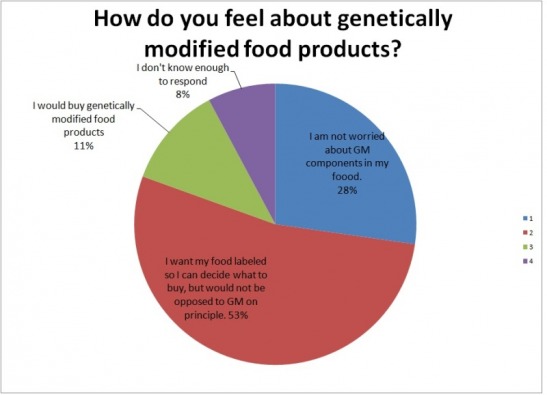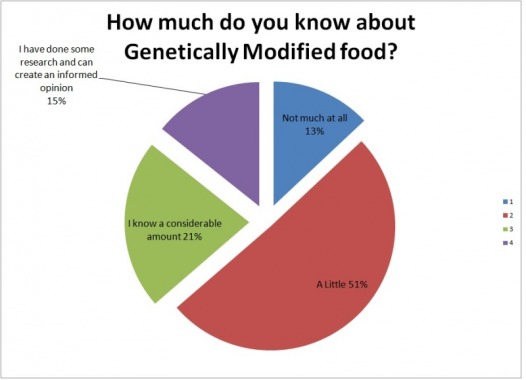The Genetic Modification Debate
Consumer's Opinion
Using this information, consumers can help work for change through their purchasing decisions. Each time they buy a food product, they are making a statement. For many, this statement may be one apathy or ignorance. To how people feel about this topic, I have conducted a survey among the students at the University of Notre Dame to gain a sense of the knowledge of this topic and any opinions people may have about genetic modification of food. This topic is one of concern for people all of the world and in many businesses. This topic has effects on many aspects of life, from economics to the environment, and especially our body. Though of special importance for farmers, we all have an intimate connection with the food we eat.
A survey was completed, for this website, of Notre Dame students about their opinions of GM labeling and how people feel about GM modification.
Survey Results:
A survey was completed, for this website, of Notre Dame students about their opinions of GM labeling and how people feel about GM modification.
Survey Results:
Question 1:

Question 2:

.
Conclusion
Based on 77 respondents at the University of Notre Dame, this poll shows that most college age students know a little bit about the genetic modification of food. With this limited knowledge a majority feel that genetically modified foods should be labeled. Based on the second question, most people don't know that much about this topic but feel strongly that labeling should be implemented. Labeling is a complicated process, a process that does not necessarily produce more choices, because manufacturing companies make these decisions based on perceived consumer opinion (see Economic Efficiency). It is imperative that people do their part to learn more. The demographic polled was college aged a large percentage of the respondents were freshmen and students in the Glynn Honors Program. This would indicate that this demographic might be more informed then the society as a whole. However, many of these students often do not make decisions about food. Though uninformed hatred of genetically modified organisms would unwise, results indicate that 28% of students do not fear the effects of genetically modified organisms. Genetic modification is still new and the public should be cautious of possible unintended ramifications for human health and the environment.
That said, there is a lot being done to improve human health and the environment, but these technologies have not yet been developed fully. Farmers should use caution concerning the development and spread of genetically modified organisms. Technology exists that may be able to stop the spread of genes, but many are wary and this technology is has not been fully incorporated. Thirty-six percent know a considerable amount or have done some research, which is promising for the state of awareness in this demographic. Combine this with respondents who know "A Little," 87% of students polled know at least a little about genetically modified organisms. This statistic is promising. It is the responsibility of this new generation to stay updated. It is not clear whether the powers that be have the interests of the American electorate in mind when making decisions. Regulation is, by many accounts, inadequate and is even more reason for increasing public awareness.
That said, there is a lot being done to improve human health and the environment, but these technologies have not yet been developed fully. Farmers should use caution concerning the development and spread of genetically modified organisms. Technology exists that may be able to stop the spread of genes, but many are wary and this technology is has not been fully incorporated. Thirty-six percent know a considerable amount or have done some research, which is promising for the state of awareness in this demographic. Combine this with respondents who know "A Little," 87% of students polled know at least a little about genetically modified organisms. This statistic is promising. It is the responsibility of this new generation to stay updated. It is not clear whether the powers that be have the interests of the American electorate in mind when making decisions. Regulation is, by many accounts, inadequate and is even more reason for increasing public awareness.
A similar poll performed in 2007 reported that 34% of Americans believe GM foods are safe and 27% support marketing GM foods. Americans seemed unsure of GMOs but in a 2001 telephone poll, 93% of Americans supported GMO labeling.
"Labeling: Genetically Modified Foods." Recipe for America, 2007. 20 April 2010 <http://www.recipeforamerica.org/page.php?id=8>
"Labeling: Genetically Modified Foods." Recipe for America, 2007. 20 April 2010 <http://www.recipeforamerica.org/page.php?id=8>
